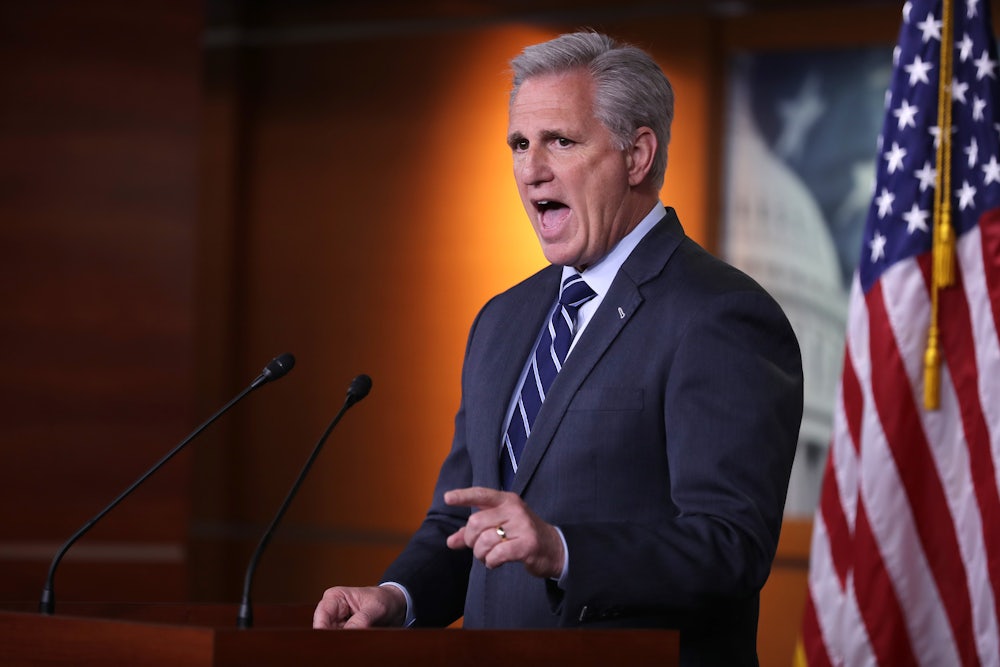California Representative Kevin McCarthy just can’t catch a break. Parts of his district were on fire last year, and—thanks partially to those blazes—climate change is a top concern for voters in his state, which has passed some of the most ambitious emissions reductions measures in the nation. Yet fossil fuel interests have been some of McCarthy’s most loyal contributors. And so long as Trump is in the White House, climate denial is likely to remain the GOP’s de facto party line. Like other Blue State Republicans, McCarthy has to walk a careful line.
So far, he’s fallen flat. Reception of the package of climate-scented bills he’s begun pushing as House minority leader has been cautious at best, openly hostile at worst. Imagined as a counter to the Green New Deal and a means to ensure the party doesn’t lose younger, more climate-conscious voters, they emphasize so-called market-based solutions and technologies like carbon capture and storage. As I wrote recently, these proposals are radically out of touch with the kinds of changes actually needed, relying too much on tree planting and unwieldy technology to get the job done. But even these milquetoast measures have faced intense backlash from within McCarthy’s party.
While he picked up support from some Republicans, lawmakers from the House Freedom Caucus and elsewhere shot back, fearing the initiative might look like a GOP-wide rollout. The Club for Growth was furious. “We think they’re stupid policies, and stupid politics,” its president, David McIntosh, told Politico for a piece published this past Thursday. “We definitely will not support candidates who endorse this proposal, and if there is a strong economic conservative running against them, we will consider endorsing them.… It is now something we will look at.”
This wouldn’t be the first time influential conservative groups have turned on their own. Worried about the possibility of cap-and-trade legislation a decade ago, the Koch brothers spent handsomely to quash South Carolina Representative Bob Inglis’s oddball brand of conservative climate politics, deploying teams of people to his town hall and donating generously to his primary challenger, Trey Gowdy. Inglis’s landslide 71-29 loss sent exactly the message the Kochs intended: Step out of line, and face the consequences. A summer of well-funded Tea Party activism in congressional districts around the country—much of it aimed at moderate Republicans—helped torpedo cap-and-trade and shift the party even further right, making climate policy a third-rail issue within the GOP for well over a decade.
This strategy worked out well for a while, taking any talk of climate policy virtually off the table as Republicans surged to take back Congress and the White House, along with nearly 1,000 seats at the state level. Florida’s Carlos Curbelo was vocal about his own heterodox Republican position on climate change by supporting a carbon tax, and lost his seat to a Democrat. Former Arizona Senator Jeff Flake only felt comfortable supporting some kind of climate policy after he’d announced he wouldn’t seek reelection last year. And few presidents have been as kind to fossil fuel interests as Donald Trump.
Until recently, climate change usually played second, third or fourth fiddle to concerns like jobs and the economy, so the GOP’s carbon revanchism didn’t really cost them. But now, as a new generation of voters comes of age, an upswing of protests and extreme weather has pushed global warming to the top of voters’ priorities. According to a recent poll, 77 percent of young, right-leaning voters say the climate crisis is an important issue to them. More than half say it will impact how they vote this year. Overall, 7 out of 10 registered voters say they want the government to do something to curb warming, and nearly three-quarters say they’re more likely to support candidates that will place stronger regulations on corporate polluters. Republicans are generally happy with minority rule, but if they want to maintain democratic majorities, they may need to choose between pleasing increasingly climate-anxious constituents and donors eager to stop Congress from doing anything about climate change at all.
American political parties are coalitions vying for control of their respective brands, with our winner-take-all two-party system awkwardly forcing very different types of politicians into the same tent. It’s why conservatives like Joe Manchin are on the same side of the aisle as a democratic socialist like Alexandria Ocasio-Cortez. Though the GOP is more homogenous in just about every way than the Democratic Party, it, too, is a coalition, with its own competing interests and internal struggles. For now it’s the party of Trump, where outright denial (i.e., calling global warming a hoax invented by the Chinese) rules the day. But it’s also the party of big business, which has its own internal divisions over climate. And then there are Republicans in places like California and Florida, who need to appeal to more moderate constituents. So long as powerful right-wing donors keep enforcing allegiance to denialist policy, they could cost the party seats and, potentially, control.
In theory, this could be great news for the Democrats, the only party with a credible claim to wanting to meet the climate challenge head-on. As the Republican coalition self-cannibalizes, Democrats can put forward their own bold vision on climate—say, a Green New Deal. GOP paralysis on climate at least liberates the left from the task of seeking some mythical compromise with a party incapable of making one.
